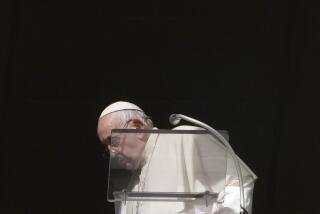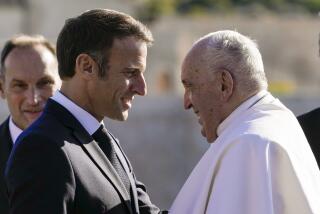Ulster’s Paisley Disrupts Talks : Pope Urges W. Europeans to Seek Unity With East
STRASBOURG, France — Pope John Paul II on Tuesday sketched a dream of continental greatness, urging the democratic nations of Western Europe to reach out in unity to their Marxist neighbors and to the poor of the Third World.
“I think the integrated Europe of tomorrow, opened toward the East of the Continent, generous toward the other hemisphere, should resume her role as a beacon in the civilization of the world,” the Pope told the European Parliament.
Members of Parliament elected from the 12 countries of the European Communities welcomed John Paul with a standing ovation on the chill, rainy last day of his four-day visit to eastern France.
But as the Pope began to speak, the Rev. Ian Paisley, the hard-line Protestant clergyman and a member of Parliament from Northern Ireland, rose to heckle him.
“I renounce you as the anti-Christ! I renounce you and all your cults and creeds!” Paisley shouted from the rear of the chamber, quoting Thomas Cranmer, a pope-hating Archbishop of Canterbury who was burned at the stake in 1556.
Waves Red Sign
Paisley waved a red sign lettered “John Paul II Anti-Christ.”
The pontiff watched in silence, a thin smile on his face, while Paisley exchanged shouted insults and barrages of paper with other members.
When Lord Henry Plumb, a Briton who is president of the Parliament, expelled Paisley from the chamber, the Pope restarted his speech to renewed applause.
Speaking in the same hall where he addressed the Council of Europe last weekend at the start of his 40th foreign pilgrimage, John Paul depicted a democratic Europe united in Christian principles and stretching from the Atlantic to the Urals.
The 21-nation Council of Europe has a legislature made up of members appointed by their governments. By contrast, members of the Parliament the Pope visited Tuesday are elected by universal suffrage in the 12 countries that in 1992 are scheduled to eliminate all internal barriers to trade.
Hailing the “new and decisive stages” of integration among European nations, the Pope predicted that this will “more fairly guarantee the rights of all of its regions.”
Noting his Polish origins, John Paul described himself as one “who knows the aspirations of the Slavic peoples, that other ‘lung’ of our same European homeland. My wish is that Europe, giving herself, with sovereign power, free institutions, may one day extend itself to the dimensions given to it by its geography, and even more, by history.”
Aid to Have-Nots
Emerging continental unity, he argued, should afford Europe greater ease and access in aiding the world’s have-not nations.
John Paul, who later this month will complete an exhausting decade as Pope with low-key observances at the Vatican, portrayed a shared Christian heritage as the common denominator in unprecedented European cooperation after centuries of distrust and violence.
John Paul started the last day of his 1988 travels at a fog-shrouded monastery in the mountains near Strasbourg. From the Parliament, he journeyed through the rain to a soccer stadium in the industrial city of Mulhouse for an outdoor Mass.
The 68-year-old Pope returned to the Vatican at night, completing 31 days and 40,000 miles of foreign travel this year, in which he made 136 speeches in half a dozen different languages.
More to Read
Sign up for Essential California
The most important California stories and recommendations in your inbox every morning.
You may occasionally receive promotional content from the Los Angeles Times.










